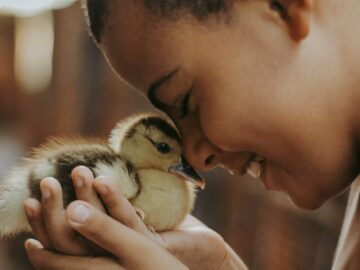Newborn babies may seem to do nothing but cry, drink milk, poop, and sleep, but they’re doing many things.
Among other things, they are growing, reacting, and adapting as best possible to the new environment they’re now living in—outside of the dark, gentle, and relatively silent chamber they’ve been in for the past 40 weeks.
Most Popular Sensory Activities for Your Newborn
If you are looking for examples of sensory activities to try for your newborn, you can do any of these popular sensory activities.
Tummy time
One of the most prevalent sensory activities to try on your baby is tummy time. As the name suggests, this involves putting your newborn down on his tummy for a limited time.
While this position lets your baby’s skin and face come into contact with the surface of the bed, it also encourages your baby to lift his head as he struggles to look for you. This makes tummy time a sensory activity and a physical exercise for your baby.
Tickling
A favorite activity for most parents, tickling involves touching your baby’s feet, sides, or armpits until he giggles or squirms. It’s a fun way to stimulate the baby’s senses and a great bonding activity for you and your baby.
Rattle
Giving your baby a safe rattle is another sensory activity you can try. It provides not only a tactile stimulus but also an auditory one (if your rattle makes a sound). Gripping a rattle is also good finger exercise for your baby.
Just ensure that the rattle does not have any loose parts that your little one might be able to ingest. Your baby’s rattle should also be soft enough so that it doesn’t accidentally cause any harm to your little one when he swings it around.
Colorful mobiles
Your newborn’s eyesight is only good until a few inches away from his face. If you go farther than that, then everything gets blurry. However, they can still see the light and dark contrasts from a distance. So, hanging colorful mobiles (with stark dark and light contrasts) on your baby’s crib will still provide him with plenty of visual stimuli.
Singing, talking and whispering
You can also provide your baby with relaxing auditory stimuli by singing, talking, or whispering gently in his ears. You don’t have to do this sensory activity separately. You can do it while your baby is breastfeeding, changing diapers, or even putting him back to sleep. It also makes your voice a comforting stimulus to your baby.
Significance of Stimulation to the Development of Newborns
Babies grow incredibly fast, even doubling their birth weight by the time they reach five months. However, it’s not as simple as just getting taller or wider. Different body parts grow at different rates; some are slightly influenced by needs and usage more than others.
Just like how the muscles of a tennis player’s dominant arm develop bigger than the muscles in his non-dominant arm, different organs of the baby are also affected by use and stimulation.
In other words, regular stimulation of these organs (especially the sense organs) will result in faster and enhanced development of these regions in the body. Not to mention, frequent stimuli help the brain form and reinforce neural connections.
Benefits of Sensory Activities for Newborns
Engaging your little ones in sensory activities brings many benefits:
- It enhances the development of the senses (sight, smell, taste, sound, feel)
- It helps make neural connections in the brain and reinforces them.
- It improves dexterity and strength.
- It helps build confidence as the baby becomes more familiar with certain stimuli.
- It fosters imagination and creativity.
Frequently Asked Questions
When can you start sensory play with your newborn?
Your baby is ready for sensory play from the start. Despite your newborn’s vulnerable size and stature, he is already capable of listening to voices, smelling scents, feeling warmth, and even seeing (although this is limited to a certain distance).
How do you stimulate a newborn?
You can stimulate a newborn in many different ways. You can gently caress his skin, especially during breastfeeding. You can talk, whisper, or even sing to him when trying to put him to sleep. You can tickle him, hug him close to you. You can also put him down on his tummy (tummy time).
How many hours a day should you play with a newborn?
Your newborn’s playtime is not going to last for hours. Most of the energy he gets will be allocated for growth, which is why he sleeps a lot. However, when your baby is awake and not fussy, you are encouraged to play with your baby as much as possible.
How do I entertain my newborn all day?
Fortunately, you don’t have to. Newborn babies spend a lot more time sleeping and drinking than staying awake. And even when they do stay awake, they barely give you an hour of interaction. It’s squeezing some activities in those short waking periods that are more of a challenge.
Do newborns need sensory toys?
A squishy toy that makes soft sounds when gripped can be good for your newborn. He’ll also probably love it for a long time. However, it is unnecessary, especially if you regularly hold and attend to your baby.
Do newborns get overstimulated?
Definitely! Being in the mother’s womb for a long time—where it’s just dark, soft, and relatively silent—newborns have to adjust to many stimuli when they come out. Bright light, cold air, and loud noises would be enough to overstimulate a newborn. So, try getting him used to stimuli gradually.
Do newborns get bored?
Yes, they do, especially if they are always left alone. Without sensory toys, people nearby to listen to, or someone to touch them, babies can also suffer from the lack of stimuli. They get bored and start crying for attention.







